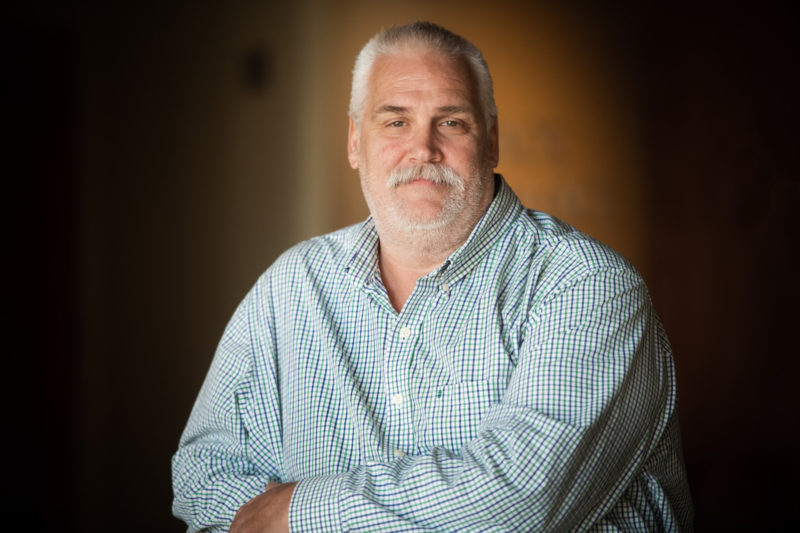
It’s fair to say that the first time he met Dr. David Murphy, Tommy Meyers ’14 made a big impression. It was the fall of 2012 when Meyers, a 6-foot-4-inch-tall U.S. Army veteran and former truck driver in his mid-40s, stopped by to see Murphy about one of his classes.
“He was huge and very serious,” Murphy, then chair of the accounting department, said of his nontraditional transfer student. “But he had a kind face. I could tell he was former military and that he was going to work his buns off in the program.”
For the next two years, Meyers did just that — full time and commuting from Greensboro, North Carolina, five days a week, for 8 a.m. classes. “That’s the honest truth,” Meyers said. “I commuted every day for two years. … I got up around 5 a.m. I’d be on the road by 5:30.
“I think I might have been late one time.”
Meyers, a self-described “numbers person,” majored in accounting. Murphy taught two of his classes — advanced and forensic accounting — and also supervised his internship and tutored him on occasion.
“Tommy was not the best student I have ever taught, from an academic standpoint, but he was by far the hardest-working,” Murphy said. “I’ll work with any student who puts in the effort, and he put in tons of effort, so I was always happy to spend as much time with him as he needed.”
That first day in Murphy’s office, Meyers also was on crutches after one of several surgeries he’d had on his knees and ankles since the early 1990s. A member of the Army’s Bravo Company 37th Engineers, assigned to the 82nd Airborne in Fort Bragg, North Carolina, Meyers was injured after parachuting into a combat zone during Operation Desert Storm.
“We were dropping our equipment in [and] I got injured and a couple of my other buddies got hurt,” Meyers said, adding that he gets choked up sometimes, talking about it. “We got out of there. We were all alive, but we’ve all got issues right now.”
Meyers, a disabled veteran who earned two Bronze Stars, added that he “stayed in [the Army] until I couldn’t do it anymore. I could not perform my duties anymore. When I got out, I worked for a trucking company and started my own logistics company … back in the States.”
In the mid-1990s, Meyers enrolled in a liberal arts college near his home in Greensboro. At the time, he was married with a child and working full time to support his family. He lasted about a year.
“It made it too difficult,” he said, “but in 2008, when the economy started going south, I went to community college to learn a new trade and that’s where I picked up accounting. I spent a year and a half at Rockingham Community College.”
Meyers first heard about the University of Lynchburg — then Lynchburg College — through baseball. While at Rockingham, Meyers, who played baseball for Western Guilford High School and later the U.S. Army, umpired baseball games, coached high school baseball, and ran youth tournaments on the weekends.
One of those umpiring gigs landed him at an Old Dominion Athletic Conference game at Lynchburg. His interest was piqued. “I got familiar with the school,” he said, adding that a small-college atmosphere was what he was looking for to continue his education.
“I did research, I asked a community college instructor what he knew about them, and Lynchburg was the perfect fit for me. So I applied, came to visit, and I got accepted and started school.”
When Meyers started at Lynchburg, he was old enough to be a dad to most of his classmates, but it was never a problem. “It was different. It was really different because they were a lot younger,” he said. “I was probably twice as old as most of them, but being there at Lynchburg was a great experience because all the students in all the classes seemed to be very helpful.
“I never had one that wasn’t helpful to me or didn’t want to work with me. Even the professors at the time made me feel welcome. It was a good learning environment. It really helped me develop and see where I wanted to go in my career.”
Where Meyers went, just a few months after finishing his bachelor’s degree in January 2014, was the Defense Contract Audit Agency. As Meyers puts it, the U.S. Department of Defense-affiliated group “makes sure the war fighters have high quality equipment for less money. We want to protect the taxpayer dollars. We don’t want contractors overcharging.”
He added, “We audit the contractors that deal with the government.”
Meyers works in the DCAA’s Coastal Branch Office and was recently promoted to supervisory auditor. He said his former military experience frequently enters into his work at the agency.
“But now I get to see the other side, where this stuff comes from, how some of the stuff is made,” he said. “Are we really giving them the best quality stuff for the best dollar? … It all plays a big part. It’s a really fabulous agency to work for.”
When jobs open up at the DCAA, Meyers sends the announcements to Murphy, whom he has kept in touch with over the years. Meyers also returned to campus recently and talked with some of Murphy’s current students.
“We’ve stayed friends,” Meyers said. “We built a friendship after school.”
As for Murphy, he’s happy to have made a difference. “It’s nice to know that at least once in a while I have an effect on a student’s life,” he said. “It makes the years of teaching worthwhile.”

